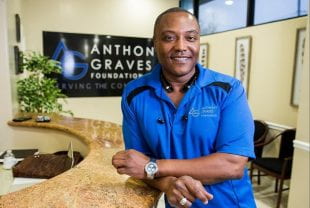Q&A and book signing to follow event, which spotlights criminal justice work across campus
Anthony Graves was wrongly convicted of murder at 26 years old. He spent the next 18 years on death row, appealing that conviction until his exoneration and release from prison in 2010. His story stands as a saga of injustice that can too easily occur in contemporary America.
Today, Graves travels the country sharing this story. And Oct. 7, he’ll be telling it in Duncan Hall’s McMurtry Auditorium as he challenges his audience to mobilize for reforms to our nation’s criminal justice system. “An Evening with Anthony Graves” is free, but registration is required.
Graves will conduct an audience Q&A following his talk and will be signing copies of his memoir, “Infinite Hope,” afterward in the Duncan Hall lobby. He’ll by joined there by a variety of call-to-action booths that allow attendees to learn more about the organizations fighting for criminal justice reform and civic action in America.
“Anthony Graves’ story is his personal experience of being wrongfully convicted because of the justice system’s coercion coinciding with a judge and a prosecutor being up for reelection — all of these machinations showing how the system can go wrong,” said Danika Brown, director of curriculum and fellowships for Rice’s Center for Civic Leadership (CCL), which is bringing Graves to campus along with co-sponsorship from the School of Humanities and the School of Social Sciences.
“What’s really inspiring about him is the way he frames this as something that is on all of us to fix,” Brown said. “It’s not a glitch in the system. It’s how we elect our officials and what we demand from them in terms of justice; it’s whether or not we choose to serve on juries and who gets represented on juries.”
Graves, in fact, inspired Brown during a talk he gave last year. Realizing that her colleagues at Rice — faculty, staff and students alike — were already performing vital work on the very topics Graves discusses, Brown was inspired to act.
Just within the CCL, she said, two Houston Action Research Teams of undergrads are investigating the way the Houston Chronicle endorses candidates for elections and working with the Texas Criminal Justice Coalition (TCJC) on improvements to pretrial procedures. Brown herself is leading an Alternative Recess trip next month focusing on civic engagement and how the criminal justice system can often prevent vital civic participation. And this year’s Houston Policy Challenge theme is criminal justice.
More work is performed elsewhere on campus, from sociology lecturer Robert Werth’s papers on punishment and penal effects on social inclusion to history professor Caleb McDaniel’s research exploring the connections between slavery and the convict labor system that arose after the Civil War.
The event will bring visibility to this cross-campus work while offering ways to mobilize attendees around such issues as bail reform, reentry programs, mental health services and other criminal justice issues that grow more pressing as the rate of incarceration in the U.S. continues to increase; nearly 1 in 2 adults has had a family member sent to prison or jail, and 1 in 7 has had a family member incarcerated for over a year.
Brown hopes the attendees will find themselves as spurred to action by Graves as she was.
“His story is about civic engagement and that without our engagement and understanding of these systems, this isn’t going to be changed,” Brown said. “He really motivates people to act.”
“An Evening with Anthony Graves,” Oct. 7, 7-9 p.m. McMurtry Auditorium, Duncan Hall, 6100 Main St. The evening is free and open to the public, but registration is required.


